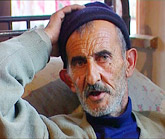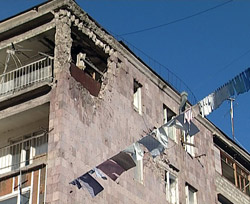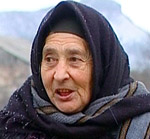However, it seems as though the Armenian village Aygepar and the Azeri village Alibeyli located on the border of the two states are two different planets. The war between the two people of the villages didn’t take long, but they have suffered and still suffer the consequences.
Filming has been sponsored by the Catholic Relief Society Armenian branch, the “Armenian Round-Table Fund” and the Netherlands’ “Cooperation Development inter-ecclesiastical organization”. The Armenian “Shoghakat” television network produced the Armenian film (director Ara Shirinyan), while the “InterNews” organization produced the Azeri film (director Ayaz Salayev). The film is narrated and there are no subtexts. The residents themselves talk about their lives and remember the not too distant past when they used to live peacefully in the so-called Soviet Union empire. It was a time when religion and customs didn’t stand in the way of communication.
 “We used to go to each other’s houses, Armenians owed us money, we owed money to Armenians,” remembers one Azeri.
“We used to go to each other’s houses, Armenians owed us money, we owed money to Armenians,” remembers one Azeri.
A teacher from Aygepar can’t remember exactly what caused the hatred between the people of both villages.
“I don’t know how that hatred began…”
The Alibeyli villagers say the same:
“We were good neighbors. We used to go to Armenian wedding parties and funerals. We had good Armenian friends. Now Armenians keep firing at us.”
In reality, even after the independence of both states, the residents of both villages face the same hardships and have the same expectations during the 14-year ongoing conflict. They are tired of the war, of living their lives and not knowing what’s to come. They know that the conflict has made life difficult, but the two villages don’t see a way out.
“Both sides lost a lot of lives and it’s hard for us to forget that,” say both the Armenians and Azeri.
 The elder villagers remember their friends from the neighboring village and carefully consider reestablishing ties with the “enemy”. They’re afraid. As for the youth born after independence and can’t really remember the past, they repeat the same things and go along with that. After watching the film, the viewer gets a clear picture that the Azeri side is ready for war. The children living in Alibeyli all say: “Armenians are our enemies, the devils”. They play “war” and the enemy is the Armenian.
The elder villagers remember their friends from the neighboring village and carefully consider reestablishing ties with the “enemy”. They’re afraid. As for the youth born after independence and can’t really remember the past, they repeat the same things and go along with that. After watching the film, the viewer gets a clear picture that the Azeri side is ready for war. The children living in Alibeyli all say: “Armenians are our enemies, the devils”. They play “war” and the enemy is the Armenian.
“We’re scared of Armenians. They’re everywhere and are ready to shoot.”
Armenian youth are more loyal and they are indifferent towards Azeri.
“We felt that the Azeri are like aliens for Armenian youth,” says Tigran Paskevichyan.
This is perhaps the only point of view. The rest are the same-neither the Armenians nor the Azeri need to be in a conflict. The residents of Alibeyli and Aygepar state the fact that the hatred made their lives worse, production has stopped and the villagers can no longer trade.
“We’re afraid to keep too many animals. The Armenians start to fire. I sit at home with fear and my cow goes hungry,” says the Alibeyli villager.
The woman from Aygepar shows her house ruined by the explosions from the tanks. The witnesses and injured have the same thoughts and opinions about the conflict and show the audience how the villagers live. Most of them are extremely poor and desperate. There are no planned out roads or alternatives in the films, which allows the viewer to be cold-hearted and at the same time generous towards the people living in the neighboring villages.
Possible dialogue
These two 25-minute long films are tied as one because they present two views on one issue. Two views which perhaps can’t start a dialogue, but can at least create a bridge paving the path towards a dialogue.
“We’re workng equally. We’re not even going to show it on television because the Azeri are not showing it either,” said T. Paskevichyan.
Usually, film reviews follow after each showing of a film and the themes and reviews differ. There was both aggressive and conceptual feedback. It is worth mentioning that the most interesting and heated-up discussion was with the youth of Karabakh at “Internews”. The people of Karabakh know the borders of amity and hatred.
 It’s hard to think positively after hearing the Azeri child saying “Armenians are the our enemies” and an Azeri old woman saying “Let them give back our lands”. This is the reality that one of the female residents of Aygepar is trying to analyze.
It’s hard to think positively after hearing the Azeri child saying “Armenians are the our enemies” and an Azeri old woman saying “Let them give back our lands”. This is the reality that one of the female residents of Aygepar is trying to analyze.
“They killed our children, How can we live with that? Centuries must pass before we can adapt to that.”
“To hell with the person who created war. I would only be happy to see the establishment of peace,” says an Azeri woman.
“In the end, all wars end some day. This will end too. It won’t go on like this,” says an Azeri villager.
The films with the title “The faraway, neighboring village” were shown during the “Directors Across Borders” seminar, part of the “Golden Apricot” international film festival. There was a discussion with head of the CRS Caucasian branch office Richard Hoffman, as well as Armenian and Azeri journalists. Azeri journalist Alekper Aliev asked the following question:
“I am personally offended. Until when will the two nations negotiate with the help of American and European intermediaries?”
However, neither Aliev nor any Armenian journalist could answer Richard Hoffman’s question “Are you ready to lead the negotiations yourselves?”
The discussions concerning the ways to start a dialogue gave the film directors and the participants a lot to think about.
“Everyone places emphasis on the role that these films play. They realize that a dialgoue between the two countries is necessary, but neither of the sides wants to take the first step. Nobody wants to take on the responsibility,” says T. Paskevichyan.
“This project will continue when the villagers see themselves on the screens,” said R. Hoffman.
The films will definitely be shown in Aygepar and Alibeyli. It’s possible that the the people of both villages will be able to recognize each other, remember the past and why not, decide to reestablish ties. Perhaps they will start this necessary dialogue.
P.S. Azeri film director Ayaz Salayev never works with state structures and tries to find sponsors from independent sources. He was invited to attend this discussion, but he didn’t show up. However, there were people who were waiting for him.

